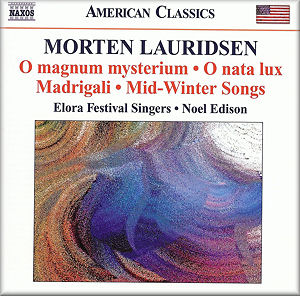 |
 |
|


alternatively
CD:
AmazonUK
AmazonUS
Download: Classicsonline
|
Morten LAURIDSEN (b. 1943)
O nata lux from Lux Aeterna (1997) [5:03]
Madrigali: Six Fire Songs on Italian Renaissance texts (1987)
[21:39]
Ov'e, lass', il bel viso [3:07]
Quando son più lontan [5:37]
Amor, lo sento l'alma [2:03]
Io piango, che 'l dolore [3:20]
Luci serene e chiare [3:14]
Se per havervi, oimè, donato il core [4:18]
Les Chansons de Roses (Rainer Maria Rilke) (1993) [16:58]
En une seule fleur [2:57]
Contre qui, rose [2:46]
De ton rêve trop plein [2:09]
La rose complète / Dirait-on [9:04]
Mid-Winter Songs (Robert Graves) (1983) [19:02]
Lament for Pasiphaë [5:19]
Like snow [1:37]
She tells her love while half asleep [4:26]
Mid-winter waking [1:52]
Intercession in late October [5:44]
O magnum mysterium (1994) [5:52]
 Leslie De'Ath (piano: Chansons) Leslie De'Ath (piano: Chansons)
Elora Festival Singers/Noel Edison
rec. 25-28 January 2006, St. John’s Church, Elora, Ontario, Canada.
Song texts provided
 NAXOS AMERICAN CLASSICS 8.559304 [68:28] NAXOS AMERICAN CLASSICS 8.559304 [68:28] 
|
|
|
I first encountered the music of Morten Lauridsen on a Christmas
disc from Audite - review -
where I was won over by the ‘high loveliness’ of O
magnum mysterium. Subsequent hearings haven’t changed
my mind, although I do realise that when the quality of singing
is that good - Vox Bona are a first-rate ensemble - even the
most mundane pieces are apt to sound better than they actually
are. The Elora Festival Singers aren’t a bunch of enthusiastic
amateurs either, so I fully expected them to bring out the
best in this music.
O nata lux (O light born of light) is certainly beguiling,
with a smoothly contoured vocal line that conceals moments of
genuine repose. That said, it does sound a little anodyne at
times, although part of that could be due to the chorus who,
although they sing tolerably well, are somewhat lacking in character.
Perhaps the six settings from Madrigali would bring some
much-needed fuoco to this rather cool collection. Sadly
not; even when the singers are at their most animated they seem
curiously passionless - well-drilled, certainly, but dull.
The recording is somewhat dry and close, so there’s no
extra warmth or body to the choral sound. Indeed, the treble
is on the bright side, which renders the women’s voices
a touch fatiguing at times. As for Lauridsen’s choral style,
it seems much too safe and well-manicured to make a lasting impression;
even the animated opening to the third fire song fails to raise
the emotional temperature by more than a few degrees. Once again
I’m inclined to think the choir’s rather grey sound
- diction is a real issue - doesn’t help matters much.
I can well understand this rep would appeal to singers of even
modest abilities, but surely professionals would feel short-changed
by music that offers them so little to chew on? Perhaps the
four Rilke settings would offer more of a challenge. There
is some
nimble singing here, but nothing to take the singers out of
their comfort zone. Trouble is, Lauridsen’s tempi are all so
similar, the effects so uniformly dreary, that even the occasional
ray of sunshine can’t lighten the gloom. At least the ‘dying
sun’ of Lament for Pasiphaë, the first of
the Graves settings, is accompanied by some hefty piano playing,
adding welcome colour to the proceedings. Alas, even that isn’t
enough to save this disc, the piano suddenly more distant in Like
snow and the subsequent Graves songs.
Frankly, it’s all rather dispiriting, so much so that I
was beginning to think I’d been horribly wrong about O
magnum mysterium, the piece that had attracted me to Morten
Lauridsen in the first place. Actually, it is rather lovely,
even though there is none of the weight, warmth or unanimity
one hears in that Vox Bona account. Now, if only the rest of
the music were as assured as this. ...
Lauridsen fans will probably flock to buy this disc, safe in
the knowledge that it won’t tax them in any way. Others
looking for more varied and interesting a cappella collections
- and more distinguished singing - will have to look elsewhere.
Dan Morgan
|
|




 All Nimbus reviews
All Nimbus reviews








